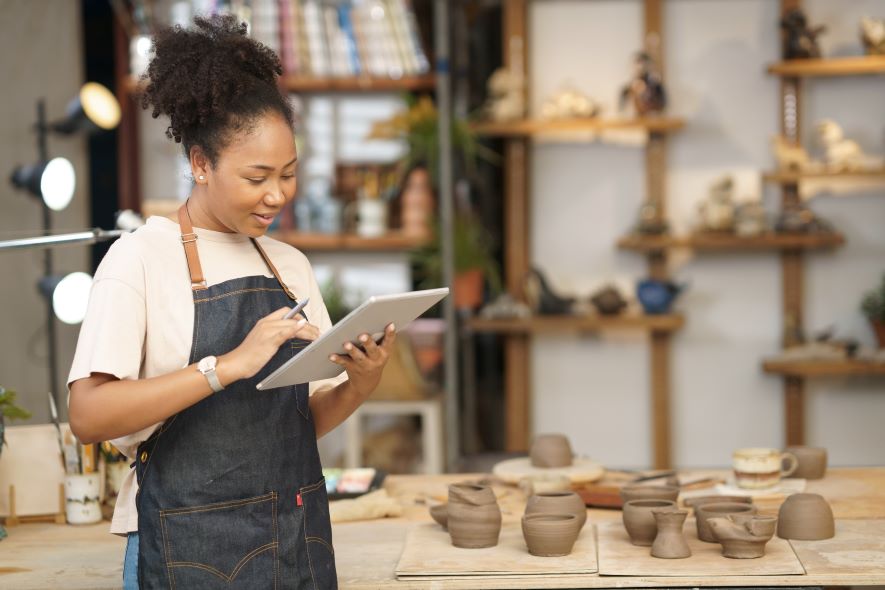Podcast Key Highlights
- What Is an Intangible Asset?
- It’s something you really can’t touch, like a patent, trademark or intellectual property.
- How Do You Value Intangible Assets?
- If you research how to value intangible assets, you’ll find dozens of methods.
- Instead of doing these, you can simply ask a potential buyer of your business to calculate what they think your intangible assets are worth.
- Once they provide that number, you can use discounted cash flow to see if it makes sense.
Transcript
The views and opinions expressed on this podcast are for informational purposes only, and solely those of the podcast participants, contributors, and guests, and do not constitute an endorsement by or necessarily represent the views of The Hartford or its affiliates.
You’re listening to the Small Biz Ahead podcast, brought to you by The Hartford.
Our Sponsor
This podcast is brought to you by The Hartford. When the unexpected strikes, The Hartford strikes back for over 1 million small business customers with property, liability, and workers compensation insurance. Check out The Hartford’s small business insurance at TheHartford.com.
Gene (00:02):
Hey everybody, this is Gene Marks and welcome to another episode of The Hartford Small Biz Ahead podcast. Thank you so much for joining me.
Gene (00:10):
You know, I like to talk about different issues that affect us as business owners. A couple weeks ago I did a podcast episode on succession planning and using a multiplier in your business. Succession planning is so important to so many of us. I mean, half of the U.S. business owners are over the age of 50.
Gene (00:28):
That’s according to the Small Business Administration. I mean, if you’re running a business, you gotta be thinking ahead about planning for an exit or how you’re gonna move your business down to the next generation. Honestly, even if you’re not over the age of 50, you wanna be doing everything you can to value your business as, as best as possible.
Gene (00:46):
I like talking about succession planning topics, that relate to valuing your business. And that’s what brings me to the topic for this week.
Gene (00:54):
It’s about intangible assets. How do you value an intangible asset? Like, first of all, let’s make sure that we’re clear what an intangible asset is, right? It’s something that you really can’t touch. It’s like a patent or a trademark or your business’s intellectual property or licenses or copyrights or customer lists or there can even be intangible assets related to your brand name or where you’re located, or even the value of your employees in your business. I mean, when people buy a business, they look at the tangible assets and then they have to make a judgment about the intangible ones. So I gave you examples of all the intangible ones. You know what the tangible ones are like the cash is tangible. I mean, it is what it is, right? Accounts receivable, you know how to value that. I mean, somebody owes you a hundred dollars, it’s worth a hundred dollars, right? Even like fixed assets and property. I mean, those are tangible. You can knock on ’em and get a valuation on your property.
Gene (01:57):
You can look at real estate values in the local area. If you have a fixed asset, you can look at, similar types of fixed assets that are being bought and sold. There are marketplaces for them. So you can figure out a fair value of them. But what about intangible assets? How do you value the worth of a patent or a trademark or a copyright? When you’re coming up with a purchase price for your business or somebody is offering to buy your business and you’re holding onto a patent, how do you value that? Well, if you Google around, there are sort of, there are like dozens of ways of valuing intangible assets. I’m skeptical of them all, and I’ll tell you the reason why. It’s because a lot, most of them are using projected numbers.
Gene (02:46):
And I always get a little skeptical whenever people are using projections to value anything. It’s not normally… cause it’s a projection. There are different methods that you could look up. And again, this is a podcast, so I don’t wanna go through like the specific formulas and stuff. But there’s things like the income method and there’s the with and without method. The income method is basically sometimes called, people call it the excess earnings method. You’re projecting your income from that patent in the future or the earnings of that patent in the future. And then maybe you’re discounting it back and that’s a separate calculation how you do a discounted cash flow specifically from that patent. There’s other ways of like, judging, like, what’s our business worth with this patent?
Gene (03:39):
Or what’s it worth without the patent? So some people take an approach that way, but again, it’s really kind of based on projections and it’s just a very, very hard thing to do, to estimate what that is worth. Which, remains a conundrum. It remains a puzzle for a lot of business owners how to figure these things out. So I have some suggestions. You’ve got your business, let’s say you’re not using a multiplier method to sell it. You’re using a asset-based method. Somebody comes to you and you wanna sell a business or you wanna buy a business. But say you’re selling your business and people are looking to value the assets that you have, because they’re gonna give you a price for those assets.
Gene (04:26):
Number one is, you wanna go to the purchase that the person that wants to buy your business and say to them, like, what do you value these intangible assets. I’ve got this patent, I’ve got this brand, we’ve got this great location. What kind of a value do you put on it? Let your buyer do the legwork. Put it on their heads to figure it out. If it’s a good faith buyer, they’re gonna make you their best offer that they, what they think it’s worth. And you can actually ask them how they came up with, that number. It’s a good place to start rather than you doing it yourself and putting the onus on yourself, that puts pressure on you, and you might really mess it up.
Gene (05:17):
You might go through some of these methodologies that I mentioned earlier and come up with a too high a value that turns off a seller or too low a value. So you’re underpaying yourself. So my first advice I tell clients when it comes to valuing their intangible assets is to go to the buyer and say, you do it. You value this, and then let’s start it from there. So that’s number one. Secondly, I think that it’s helpful to do some of these calculations and of all the different calculations out there, and there are many, I do like the income method it’s called, or the excess earnings method. I mean, and that’s, it’s better than basing your, your intangible value based on cost. There’s a cost method which says, well, whatever you paid for this, that’s what the value is.
Gene (06:02):
Well, that’s not necessarily true. There might be some way to determine a marketability of your assets. Say you’re trying to value the location of your business. You can be like, “Hey, look at the locations of businesses near us and look what they’re worth and look what their location’s worth. So therefore, this is what our location’s value might be.” But all things aside, I think projecting out the income or cash flow that you think you’re gonna get from this asset, even trying to discount it back using a, like a 5% discount rate. And again, that’s another conversation as to how you do discounted cash flow. But you can look it up. Discounting it back from those projections for the next five or seven years of income should, should give you at least a basis. And the reason why I say to use that is because when the buyer comes back to you with what they think the value of your business is, you can come back to them with this discounted cashflow basis and say to them, okay, this is what I think it’s worth.
Gene (07:01):
And it might give you some supporting documentation to say, okay, this is what I think makes the most sense. It’s kind of backing you up on what the buyer is saying. So number one, when it comes to value and intangible assets, ask the buyer to do the calculation for you, okay? If you’re selling a business, number two is even when the buyer comes back to you with a number, work through a couple of the models that you’ll find on the internet. But the number one that I like is discounted cashflow or the income method, to show you what you think it’ll get. Work through that model and see if it’s in the ballpark and it makes sense. I mean, that is the best advice I have for valuing these intangible assets. And you’re not gonna get any better advice.
Gene (07:43):
So that’s the sort of the strategy that I take when, when I advise clients when they’re selling their business that has intangible assets. Get a number from the buyer first, and then run one of those models or two and back it up just to make sure. And then hopefully you can agree on something in the middle or something close by that makes sense for you. My name is Gene Marks. You have been listening to another episode of The Hartford Small Biz Ahead podcast. Hope this helps you in your quest to value your intangible assets. If you’ve got any advice or tips or help in running your business, please visit us at SmallBizAhead.com or SBA.TheHartford.com. Again, my name is Gene Marks. Look forward to speaking again with you next week. Take care.
Download Our Free eBooks
- Ultimate Guide to Business Credit Cards: The Small Business Owner’s Handbook
- How to Keep Customers Coming Back for More—Customer Retention Strategies
- How to Safeguard Your Small Business From Data Breaches
- 21 Days to Be a More Productive Small Business Owner
- Opportunity Knocks: How to Find—and Pursue—a Business Idea That’s Right for You
- 99 New Small Business Ideas





